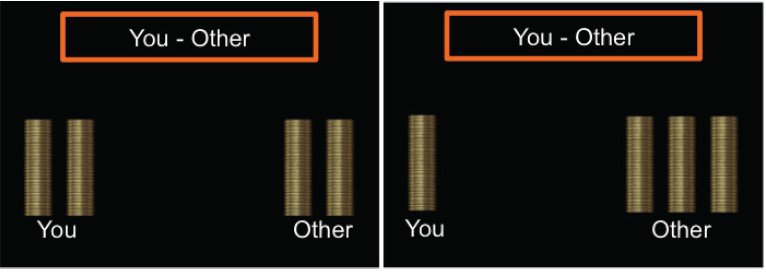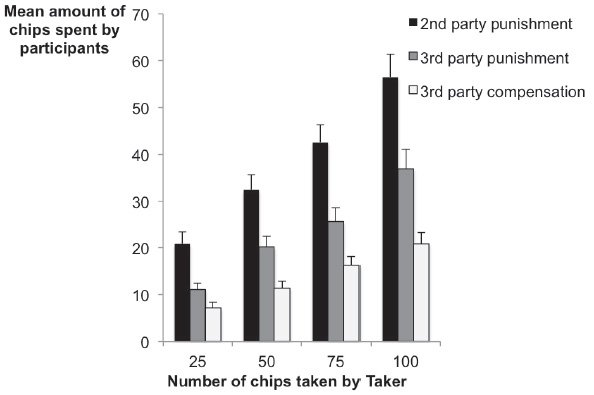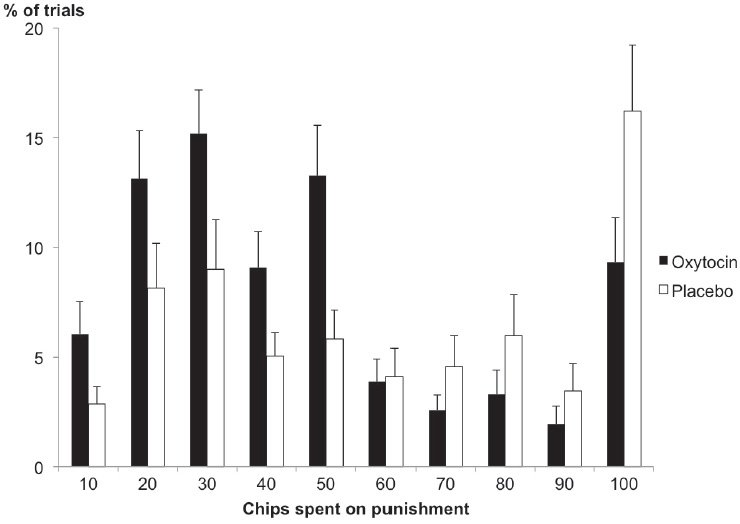Whether something is an injustice or not, a perception of injustice will often lead to disagreements and conflicts. Our sensitivity to injustice takes shape as minor conflicts between friends or family members, to large-scale wasteful conflicts at the level of nations and cultures.

Source
Injustice is an important aspect of our society, where we make decisions as individuals or as groups to punish transgressors of social norms and compensate victims. But the science with respect to injustice has little to say on how the brain processes these real or perceived violations.
A study was conducted to provide neurobiological insights about social injustice by combining psychology, neuroscience and economics to explore perceptions of injustice related to punishment and compensation decisions. The results published in JNeurosci suggest that punishing a wrongdoer is more rewarding to the brain than supporting a victim.

Source
Participants in the study were young men who played a "justice game" and had their brain activity measured. The game involved a "Taker" and a "Partner" each start out with 200 chips. Takers can steal up to 100 chips from the Partner, and the Partner can spend 100 chips to retaliate and take up to 300 chips from the Taker. Participants played as either a Partner or an "Observer" who could punish the Taker or help the Partner by spending chips to increase the chips the Partner's had.

Source
As you might expect, those who played as a Partner and experienced injustice directly, were more willing to punish the Taker that personally did the injustice to them. Those who played as a third-party Observer were less personally affected to feel an injustice and less willing to punish the Taker compared to the Partner.

Source
The brain region associated with reward processing had activity when decisions to punish were made, and different levels of activity was seen in the severity of punishment dished out.
Participants were also randomly given a placebo or oxytocin nasal spray before beginning the experiment. Those who received oxytocin were affected by giving less severe punishments, but they also gave more punishments. Oxytocin appears to increase corrective punishments but make them more fair, and the difference is measurable in the brain. However, decisions to compensate victims were unaffected. Oxytocin doesn't appear to act as an enhancer of empathy, altruism or pro-social behavior.
When faced with an injustice, we have a strong desire to deal with wrongs committed. We prefer to punish a wrongdoer, than support a victim. I see this as relating a need to have consequences for wrong actions. If anyone who treats others improperly isn't faced with consequences, then they are free to continue to create wrongs and injustice as much as they want. With consequences, we an learn from our mistakes.
I had recently posted about a study that dealt with punishment in a prisoner's dilemma scenario related to cooperation. It was found that punishment didn't produce more cooperation in that game theory model. I still view applying consequences to actions as a valid punishment that corrects and realigns people with the reality of their wrongfulness. Otherwise, if they don't listen to reason, they have no reason to change their motivation for the wrong actions they engage in, and more victims will be created by them continuing their behavior.
What do you think? Have your say.
- Is punishing a wrongdoer more rewarding than helping a victim?
- Is one more important than the other, or both equal?
Thank you for your time and attention. Peace.
Recent posts:
- Chaos Teaches
- Sexually Objectified Women Get Less Empathy
- The Power to Create Good and Evil
- Social Media, Downvotes, and Pure Direct Democracy Majority Rule
Are Violent Video Games Linked to Violent Behavior?- Non-Aggression and Justice
If you appreciate and value the content, please consider: Upvoting, Sharing or Reblogging below.
 me for more content to come!
me for more content to come!
My goal is to share knowledge, truth and moral understanding in order to help change the world for the better. If you appreciate and value what I do, please consider supporting me as a Steem Witness by voting for me at the bottom of the Witness page; or just click on the upvote button if I am in the top 50.

An equally fundamental question is what standard should be taken as "proof" of guilt to warrant punishment. My point is that the justice system cannot be perfect, meaning that it is certain at times to free the guilty and at other times to punish the innocent.
Given this state of affairs, the question becomes where the bar on "proof" should be set. By definition, the less we demand of the state before incarcerating an individual, the more innocents will end up in prison; alternatively, the higher the bar is set to prove someone guilty, the more criminals will go free.
I pose this not with any clear solution in mind, but simply to put it on the table as part of this same discussion.
Yup, that's a problem in trying to apply justice, false conviction of innocents and acquittal of the guilty... proving truth is a hard task... :/ Thanks for the feedback.
I'm not surprised that Oxytocin would make punishments more fair. I believe that important decisions should be made when our minds are in a 'positive/calm' state. It would make sense to meditate as well. I believe in fair punishments that re-educate when possible, eliminating the ground for future crimes.
It is perhaps more rewarding as it empowers us to feel we are also helping free society of evil.
Helping the victims is not easy for everyone, as we fear facing sadness, anger, and all our array of emotions.
Right on, that's why it is :) Without doing that, it just keeps growing as people keep creating it.
Well, they should expand this study to the study of Social Justice Warriors.
SJWs love to go on a rampage targeting anyone they see as the wrongdoers. They will attack anyone without much thought, for any perceived wrong (without any verification). They will even attack their own just as readily.
Unfortunately for all of us trapped in The USSA, justice is a foreign concept. Our courts do not have any justice within. Many who have had experience therein, have said truth is the first thing that dies.
Indeed, the injustice system as it is called... :/
Is punishing a wrongdoer more rewarding than helping a victim?
Apparently so.
I only have qualms about how the nature of punishments vary indicating that no one judging to punish is completely objective and continuously influenced by their environment.
It's objective in that they see the Partner having their chips Taken by the taker. That objectively happened. So someone initiated an aggression against another. Hence, the desire to punish the aggressor who is the wrongdoer.
True. What I was inferring to is the kind of detachment from oneself (which is composed of opinions, feelings, biases, food that we had that morning, Oxytocin, etc) which can only be expected from a computer; when we are expected to judge. We seep into our objectivity and "objective human" is an oxymoron and by extension "judicial objectivity". Doesn't that mean the same judge will be lenient to some and strict to other? Doesn't that mean a number of judges will have a spectrum of verdict for same offense?
A very interesting studies, I especially like the fact that they got the idea to give Oxytocin to the test subjects.
I believe that punishing a wrongdoer and helping a victim have separate but equally important goals. Punishing a wrongdoer has (or at least should have) a goal of setting an example so that the potential for future wrongful actions by the same or other wrongdoers are mitigated. Helping a victim has a goal of making things right again and creasing a feeling of safety in the society.
Revenge should not play a part in neither of these responses to wrongdoing.
I agree. And helping a victim is good to help heal them. Revenge is what? Too extreme of a consequence applied to a wrongdoer by the victim?
There is an interesting branch of psychotherapy called Rational Emotive Behavior Therapy (REBT). It's underlying concept is that we should not act impulsively based on our emotions, but use our rational mind instead.
This can also be applied to revenge. I think that revenge should not have a goal to hurt the wrongdoer, but only to mitigate the potential for future wrongful actions. With that sort of mindset, instead of harsh punishment for the sake of victim's vengeful pleasure, a just preventive punishment for the sake of setting an example and preventing similar crimes can be chosen. I hope that this makes sense. : )
To add to this, injustice usually provokes a reaction which may in the extreme cases, result in death. In Northern Nigeria for example, anyone who steals has his hand severed off if cut. This is even worse in the East where thieves arecompletely burnt to death
warning:graphic image
.jpeg)
Don't ask me if I support this or not, but I think it is not unrelated to the rewarding feeling achievable from purnishment of injustsice perpertrators according to your post
Punishment has degrees of severity. Cutting off hands and burning alive are too extreme, if you ask me :/ Yes, I'm sure some people feel good and that its rewarding to do these things...
Woo nice
"We prefer to punish a wrongdoer, than support a victim. " - doesn't really surprise me, people also prefer to point the finger then look for solutions. Good post by the way!
AS we all know judicial system is based on the Proof system, no matter that proof is wrong or right,
Their should be a system to judge these proof on the basis of truth.